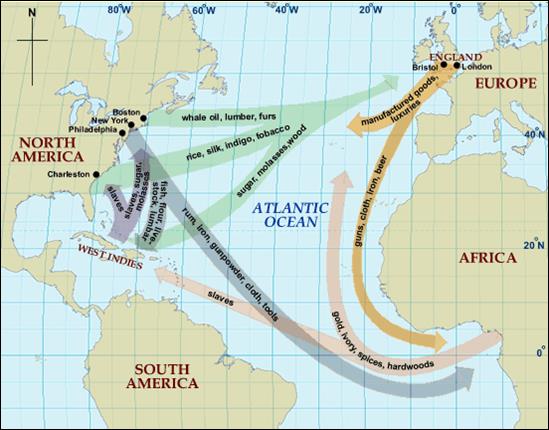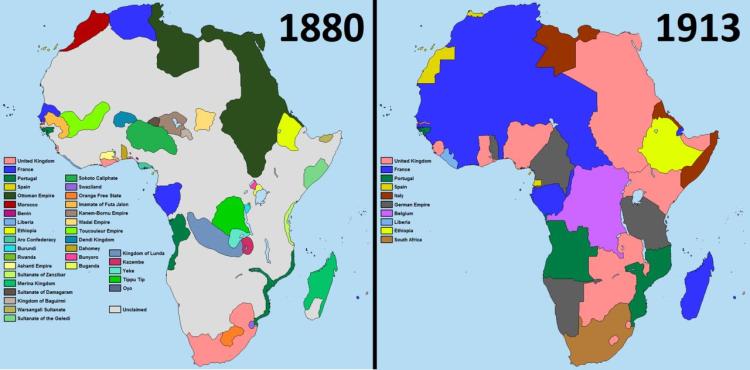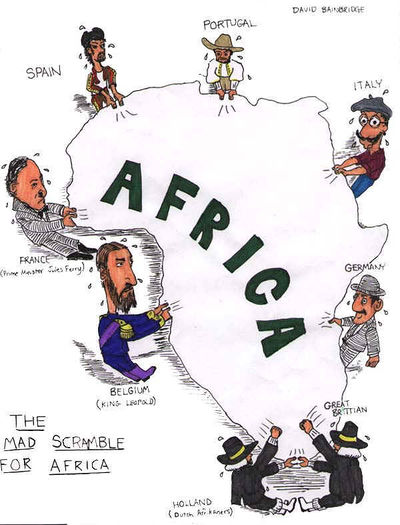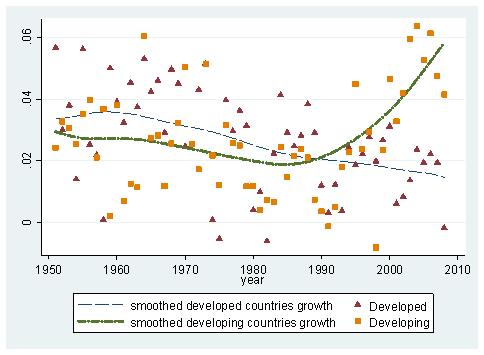Hey all, so I did a university module this year in International Development and decided that I would write a blogpost detailing some of the stuff I learnt. It is in a simple to read format and is also informed by academic literature (you can see the reference list at the end). I hope you enjoy learning about slavery, colonisation, and other global issues that you may have never thought about before- enjoy!
Introduction
I chose this module in International Development as it reflects an interesting period of my life. In second year, I completed a study trip in China. Last year, I did my year abroad in Copenhagen and afterwards attended a study trip to India which ended just weeks before the module began. These international experiences have planted a strong desire in me to learn more about the global world we are in.
NOTE: I must also admit that I have a vested interest for choosing the first two topics. I personally regard myself as an African British Indian. Whilst I was born in England, my mum was born in India whilst my father was born in Tanzania. This coupled with the fact that I was also raised in Kenya until the age of 10 meant that I was particularly drawn to colonialism and independence due to the notable impacts on India and Kenya.
The topics I will be covering are:
1: The transatlantic slave trade
2: Legacy of colonisation and independence
3: Importance of geography on development
4: Can we truly measure development?
5: The future of development
With this said, I would like to take you on a journey of wonder and awe with my new thinking about the world. These are mammoth topics and thus I can only give you a snapshot. Hopefully however, it will pique your interest enough so that you can go and explore more for yourself!
Judah
1: The transatlantic slave trade
Until this lecture, I’d just seen African governments as corrupt, inefficient and unwilling to change. However, if anything I’ve begun to gain a glimpse into how much slavery has adversely affected African development today.
The context for the trans-Atlantic slave trade and colonialism itself stems from the fact that Europeans came to be innovative in different areas such as weapons and naval capacity (Potter 2000; Bernstein et al 2000). Inventions such as rail and steam led to a much greater demand for materials as well as the means to transport them globally. This led to a creation of new markets with an exponential increase in the demand and supply of materials. Within the 15th-18th centuries, the pre-dominant ideology of the time that drove this notion was coined, “Mercantilism”. Chang (2003) helpfully explains that this is when countries used protectionist measures such as limiting imports alongside exporting commodities in order to generate more wealth.
With this came the advent of slavery. It came as a surprise to me that it was actually the Portuguese who were the first Europeans to export slaves (although it had actually taken place for centuries by Arabs!). The Portuguese began conducting trade in West Africa in the 1400’s and from this they later began moving slaves abroad to work in Portuguese cities such as Lisbon. Various sources point out that by the early 1500’s around 10% of Lisbon was of African descent (Adi 2012; Rose 2012). Within the same time period, other European countries developed appetites and industries for luxuries such as sugar, cotton, coffee and cocoa. Countries such as Britain became involved and from this the transatlantic slave trade was born. In total, it is estimated that around 12 million slaves (equivalent to the size of Senegal today) were shipped abroad! Have a look below to see an example of what this looked would have looked like visually:

What really shocks me is that this unequal exchange that took place was carefully and logically planned. America utilises slave labour to produce in-demand materials which are then sent to Europe. Europe then develops these materials to produce manufactured goods which it then sold to Africa for even more slaves. This cycle continues for hundreds of years until as late as 1888 when Brazil becomes the final country to abolish it. However, apart from the direct fact that the main materials sent to Africa included guns, beer, and rum- were there other repercussions from slavery on African Development?
Nunn et al (2008) and Acemoglu and Robinson (2013: pp.60) advocate that the culture of mistrust in Africa is a direct legacy of the slave trade. Contrary to what I believed, it was primarily Africans who sold slaves to traders. Many were prisoners of war and obtained through raids by neighbouring villages (Maddison 2000). This led to open hostilities and over a few hundred years led to difficult relations with those from different ethnic groups (ibid). Nunn et al (2008) conclude that these actions were mainly a result of genuine insecurity which often led to the need of weapons to defend themselves.
As a result, it is undoubtedly clear that slavery took its toll on Africa, but what were the effects of colonisation on the continent? In the next section I will go briefly into the routes on colonisation in the “scramble for Africa” before looking at post-colonial and independent Africa.
2: Legacy of colonisation and independence
This was another thought provoking topic as we looked at the residual effect of colonialism in countries today. In class we were split into groups to look at the history of colonialism in a certain country to then do a presentation on it. I chose Kenya and was intrigued to learn so much about its struggle for independence (e.g. the Mau Mau uprising and Jomo Kenyatta’s pivotal role). I also remember vividly writing down facts from other group presentations and excitedly telling my family all about Kenyan and Indian colonial history when I arrived home that day. We were also tasked with doing independent research and with this I found a large amount of information relating to decolonisation in Africa.
Firstly, I want to take you back to the context for African colonisation which arises from the “scramble for Africa”. Dating back to 1870, European powers decided that they wanted have a stake in Africa and carved up the continent between themselves (Rose 2012). Bernstein et al (2000) note that in 1876, 10% of Africa was autonomous. However, by 1900 around 90% of Africa was claimed by European powers! Have a look at the image below to get an idea of this (The grey colour indicates unclaimed regions):


These European powers largely retained their power in Africa until after world war two where a rapid area of decolonisation then took place. There were various reasons for this. One is the ideological notion that returning soldiers from the war desired the same freedom that the allies sought (Chandra 2012). Another reason is an economic one. There is the belief that the colonies’ desire for independence may have met stronger resistance from their erstwhile imperialist masters, had not the domestic reconstruction effort following WWII been a more pressing priority (ibid).
This decolonisation process that took place was highly significant as it has affected African development until this very day. The outcome has been the emergence of “Less Economically Developed Countries’ (LEDC’s), ‘weak’, and ‘fragile states’. By the 1970’s, although the majority of European nations such as France, Britain, and Portugal had lost their dominance in Africa, the departure of these empires still had aftershocks in Africa.
Firstly, one impact on African development was the weakened state of the newly independent African governments. Due to the withdrawal of experienced colonial leaders, poor management led to an increased chance of poverty (Meredith 2005: 368). Moore (2001) reinforces that the history of external control, both direct and indirect often led to a dependence on the colonial power. Here he likened the problem to “puppet states”; where local elites were supported economically almost entirely by their colonial powers and this often led to a flagrant disregard for native inhabitants.
Worryingly also, is the ‘curse’ of international aid in Africa (Easterly 2006; Moore 2001; Acemoglu and Robinson 2013; Alemazung 2010). I was distraught to find that despite aid from Western countries being sent to increase economic development, lack of stringent regulation allowed regimes to use these additional capital inflows to prevent democracy from forming, and thus these leaders could retain their prestige in the long-term. Spiegal (2005) notes the poignant words of Bokassa, a former Central African Republic leader, “We ask the French for money. We get it, and then we waste it.” Furthermore, I find that an ex-president of Congo, President Mobutu who reigned for over 30 years, aptly sums this feeling up: “Democracy is not for Africa. There was only one African chief and he ruled for life.” (Shillington 1995: 3).
Thus, it is clear that African governments were affected and many continue to be affected today by the impact of colonisation dating back to 1870. But for the next section, I hope to draw on a new topic: does geography significantly affect a country’s development?
3: Importance of geography on development
Unlike others who may have learnt this in their geography GCSE, I was completely amazed with something I had never thought about before- that a country’s geographical factors (such as latitude, climate, proximity to sea) arguably has an impact on development.
To get a clear picture of this, let’s take the two countries that Easterly and Levine (2002) use: Burundi VS Canada.
Easterly and Levine (ibid) state that Burundi currently has a GDP per capita of $200 and is poor despite a fertile agricultural environment. The authors state that this development can be summarised aptly: It is in a tropical climate, landlocked, no rich trading partners and a high risk environment of diseases. As a result, life expectancy is a meagre 47 years. Then compare this to Canada which has a per capita income over 100 times that of Burundi’s. Easterly and Levine (ibid) argue that this is because it is in a more temperate area, borders a rich trading partner, has a close proximity to the sea, and low risk of disease. They assert that this has led to a much higher life expectancy of 79 years.
I have found that this notion that geography can hinder development is not new. Historically, authors such as Montesquieu (1778) noted:
“…in the climates of the north, peoples with few vices, many virtues, sincerity and truthfulness. Approach the south, you will think you are leaving morality itself.”
However, authors note that looking beyond these frankly racist views, there is still reason not to disregard this ‘tropics hypothesis.’ (Easterly and Levine 2002; Acemoglu and Robinson 2013). For example tropical diseases such as malaria are likely to have a significant impact on a nation’s health and thus affect development in the long-run (Mellinger et al 1999). Gallup and Sachs (1999) further found that there was also a large disparity when taking factors such as fertilisers and labour into account- temperate areas largely outperformed in agricultural productivity compared to more tropical zones.
Alongside this issue of the climate, another fascinating conundrum also appeared in my research- what I will coin as ‘Landlockedness’. Mellinger et al (1999) write that temperate areas (such as Western Europe) within 100km of navigable sea only constitute 8% of the world’s total land and yet these areas account for over half of the world’s economic production! See if you can spot the difference in coastal proximity below (ibid):
Africa
Authors note that better proximity to the sea has implications of better transportation, trading, and thus eventually economic development. As you can see above, the issue is that around 30% of Africa’s residents live in landlocked countries in comparison to places such as Europe with a significant amount of navigable waterways. I first noted in my first topic that naval advances helped lead to slavery and colonisation. Imagine if Europe were more landlocked? Would this have prevented slavery from occurring?
To conclude, geography arguably does play a role in development although the extent to how much it matters is a particularly contested debate amongst authors. What I did glean from this however, is that there is no easy way to appropriately measure development through geography. This leads on to my next section: can we truly measure development?
4: Can we truly measure development?
Within my own degree, I have commonly come across indices such as Gross Domestic Product (GDP) and projects such as the Millennium Development Goals (MDG’s). Yet until now I have never evaluated how useful these measures were. This topic gave me the first chance in actually evaluating measures for myself.
Firstly, the MDG’s were introduced in 2000. They were the first ‘global promise’ of a better future and all 189 members of the UN came together to produce 8 goals to achieve by 2015. Now that the term has ended, we can evaluate how well these goals were met. For example, on Goal 1 to eradicate poverty, the number of people in the developing world living on less than $1.25 has more than halved from 47% in 1990 to 14% in 2015. For goal 3 in promotion of gender equality, big strides were also made that hugely impressed me. In south Asia, just 74 girls for every 100 boys were enrolled in primary school in 1990. It is now 103 girls for every 100 girls (UN 2015).
However, hidden behind there these achievements are significant issues that the UN identified in measuring the MDG’s. For example, the UN quoted a recent World Bank study highlighting that the poorest people were often unaccounted for. In Sub-Saharan Africa with known endemic levels of poverty- over 60% of countries had no proficient data to monitor poverty trends. Furthermore, the UN (ibid) stated that there is a usual time-lag of 2 to 3 years for development data and thus it can be difficult to deliver immediate decisions. They note that although this is now beginning to change with new technology, it is still a major inhibiting factor.
This leads succinctly on to a well-known indicator that is used worldwide to measure economic development: GDP. It is likely that you will have heard politicians, reports, and the media frequently using it to show how un/successful a country has been. Developed by Simon Kuznets in 1934, it is basically the total output of goods and services produced in the economy. In principal, the simple nature of GDP allows it to be used for both national and international comparisons. It is also well established and has been the main indicator to measure a country’s economic progress since 1944.
However, there are also issues with it. A whopping 292 page report was commissioned by the ex-French President Nicolas Sarkozy in order to evaluate the limitations of GDP (Stiglitz et al 2009). A key issue they found was that GDP cannot fully measure modern output. Whilst in the past, objects like computers, cars, and washing machines could be measured, more recent services such as medical or communications are harder to measure. Therefore GDP must evolve to take into account structural changes in modern society. Secondly, there is a real need to measure the actual wellbeing of citizens. GDP however does not take non-economic factors into account.
It was interesting that in our class-based exercise where we were asked to evaluate measures such as GDP; no measure was without its flaws and issues. Moreover, the problems with the MDG’s further highlight the complexities involved in measuring development on a global scale. It has begun to make me realise that measurements are just one aspect of reality, and care must be taken in how we use and interpret them. Thus, measuring development is inherently a complex process and with this in mind I would like to move you on to my final section: the future of development.
5: The future of development
I decided to introduce this section last as I believe it neatly ends my learning in the module. From looking at the past and issues such as slavery, we can now finish with an engaging debate on some development issues today and future implications for development.
Firstly, it’s important to note the changing nature of our global economy. In the past, the G7 nations (US, Japan, Germany, France, Italy, UK, Canada) dominated in terms of power and economy. However, in recent years there has been a gradual shift in the output of ‘emerging’ or more commonly coined, “BRIC” countries (Brazil, Russia, India, and China). Simply put, traditional western powers now need to adapt into new ways of thinking with these new countries and their unprecedented growth. Have a look at the graph below by Rodrick (2011) which shows you a glimpse of our exciting and changing economic landscape:

It’s important to note however, that these emerging economies are not just changing the economic landscape but also the very nature of development. In my readings, I noticed that there is a pervading fear amongst academics and traditional donors such as the OECD DAC (Development Assistance Committee) that ‘emerging’ non-DAC donors are a threat to development. Naim (2007) coins this issue as ‘rogue aid’- where countries provide aid in a non-transparent and undemocratic way that ultimately inhibits economic development. For example, Marysse and Greenan (2009) advocate that this is the case in a $6.5 billion Sino-Congolese deal in 2007. Under the agreement, the Chinese government gained vast access to mineral resources whilst Congo benefited with financial endowments and constructions. However, both authors fear that there is a more insidious drive behind this ‘new imperialism’ (Marysse and Greenan 2009; Naim 2007). They note that with China’s booming economy there is a strong need for natural resources and new markets to sell cheap goods. They worry that African mineral reserves will be depleted, with terms of reimbursement not being concessional in any way. Quite simply, in the short-run, African countries such as Congo may gain quick finances, but overall it is a largely unequal exchange balanced in favour of China (Marysse and Greenan 2009). Naim (2007) leaves us with an apocalyptic ultimatum; continued ‘rogue aid’ will lead to an alternative development model with corruption, chaos and unsustainable development in its wake.
More importantly, our changing and complex climate means that there is a need to address the way we approach development. Two authors attempt to promote this in intriguing and unusual ways. Firstly, Green (2013) stresses ‘doing development’ right can be likened to bringing up a child. Simply setting out a large-scale project with outcomes and objectives is not enough. To raise a child you have to be adaptive, reflexive, and aware of their needs and concerns. In the aid sphere, it is important to be aware of the fact that there is no ‘quick fix’ and rather like a child there can be unpredictable elements. Secondly, Ranjani (2012) likens innovative approaches in development to soccer which he notes as ‘open and responsive’. Whilst managers have a set strategy, there is no fixed script for their team due to the dynamic nature of the game. In soccer, players observe their environment in order to intelligently adapt, experiment, and then eventually score a goal. Ranjani (ibid) contends that development with its fixed pathways discourages the need to experiment and adapt. This definitive belief in experimentation and failure in development is apparent in his musings: “Perhaps when it comes to solving complex challenges… play may be just the verb we need” (ibid. pp. 9).
Closing remarks
The main thing that I want you to take away is that more often than not, the issues facing international development are complex and multifaceted. But with this comes hope- that we can evolve with new ideas for how we can fix these problems!
Thanks for joining me on this adventure of learning and discovery about international development. The story is still unfinished and it is now up to you to take up the mantle and explore more for yourself- go for it.
Reference list
Section 1
Acemoglu, D. and J. A. Robinson (2013). Why Nations Fail: The Origins of Power, Prosperity, and Poverty, Crown Publishing Group
Adi, H (2012) Africa and the Transatlantic Slave Trade. [Online] BBC. Available from: http://www.bbc.co.uk/history/british/abolition/africa_article_01.shtml [Accessed 1 December 2015
Chang, H.-J. (2003). Kicking Away the Ladder: Historical Strategy in Historical Perspective. London, Anthem Press.
Maddison, A. (2001). The World Economy: A Millennial Perspective. Paris, Development Center of the OECD.
Nunn, N., Leonard, W. (2008). “The Trans-Atlantic Slave Trade and the Evolution of Mistrust in Africa: An Empirical Investigation.” Unpublished working paper, Harvard University and NYU.
Potter, D. (2000) “Colonial Rule” In Allen, T., Thomas, A (Eds.) Poverty and Development in the 21st century. Oxford : the Open University in association with Oxford University Press
Rose, C (2012) Episode 6: Effects of the Atlantic Slave Trade on the Americas [Online] UT Austin. Available from: http://15minutehistory.org/2012/12/03/episode-6-effects-of-the-atlantic-slave-trade-on-the-americas/ [Accessed 1 December 2015]
Section 2:
Acemoglu, D. and J. A. Robinson (2013). Why Nations Fail: The Origins of Power, Prosperity, and Poverty, Crown Publishing Group.
Alemazung, J. (2010) Post-Colonial Colonialism: An Analysis of International Factors and Actors Marring African Socio-Economic and Political Development . [Online] Available from: http://www.jpanafrican.com/docs/vol3no10/3.10Post-Colonial.pdf [Last accessed 21 December 2015]
Bernstein, H. Hewitt T., Thomas A. (2000) “Capitalism and the Expansion of Europe” In Allen, T., Thomas, A (Eds.) Poverty and Development in the 21st century. Oxford : the Open University in association with Oxford University Press
Chandra, J (2012) Discuss the impact of European decolonisation in Africa in the post-war period. University of Birmingham.
Easterly, W. (2006) The Whiteman’s Burden: why the West efforts to aid the rest have done so much ill and so little good. New York: The Penguin Press.
Meredith, M. The State of Africa: A History of Fifty Years of Independence, (London/New York: Free Press, 2005)
Moore, M. (2001). “Political Underdevelopment: What Causes “Bad Governance”.” Public Management Review 3(3): 385-418.
Rose, C (2012) Episode 3: The scramble for Africa. [Online] UT Austin. Available from: http://15minutehistory.org/2012/10/24/episode-3-the-scramble-for-africa/ [Accessed 1 December 2015]
Shillington, K. (1995), History of Africa (excerpt). Paper Presented at Embassy of Nigeria.Washington, D.C. 19th October.
Spiegal (2005) SPIEGEL Interview with African Economics Expert. Available from: http://www.spiegel.de/international/spiegel/spiegel-interview-with-african-economics-expert-for-god-s-sake-please-stop-the-aid-a-363663.html (07/04/2005). [Last accessed 21 December 2015]
Section 3:
Acemoglu, D. and J. A. Robinson (2013). Why Nations Fail: The Origins of Power, Prosperity, and Poverty, Crown Publishing Group. Chapter 3: Theories that don’t work
Bloom, D and Sachs, J (1998). “Geography, Demography, and Economic Growth in Africa.” Center for International Development, Cambridge, Mass. Mimeo.
Easterly, B and Levine, R (2002) “Tropics, Germs and Crops: How Endowments Influence Economic Development”. NBER Working Paper 9106
Gallup, John L. and Jeffrey D. Sachs. 1999. “Agricultural Productivity and Geography.” Center for International Development, Cambridge, Mass. Mimeo.
Mellinger, AD, Sachs, JD and Gallup, JL (1999) Climate, Water Navigability, and Economic Development, CID Working Paper No. 24, September
Montesquieu, C. L., 1750. The Spirit of Laws (Cambridge University Press, New York, 1989).
Section 4:
UN (2015). Millennium Development Goals Report 2015. [Online] UN. Available from: http://www.un.org/millenniumgoals/2015_MDG_Report/pdf/MDG%202015%20rev%20%28July%201%29.pdf [Accessed 4 December 2015]
Stiglitz, J. E., A. Sen, et al. (2009). Report of the commission on the measurement of economic performance and social progress. [Online] Available from: http://www.stiglitz-sen-fitoussi.fr/en/index.htm [Accessed 25 November 2015]
Section 5:
Manning, R. (2006) ‘Will “Emerging Donors” Change the Face of International Cooperation?’ [Online] ODI Lecture. Available from: http://www.oecd.org/dataoecd/35/38/36417541.pdf [Accessed 20 December 2015]
Marysse, S. and Geenan, S., 2009, ‘Win-win or unequal exchange? The case of the Sino-Congolese cooperation agreements’, Journal of Modern African Studies, 47.
Naim, M., 2007, ‘Rouge Aid’, Foreign Policy, 1st March. [Online] Available from: http://www.foreignpolicy.com/articles/2007/02/14/rogue_aid [Accessed 20 December 2015]
Rajani, R. (2012). If Development Were Soccer, USAID Frontiers in Development.
Green, D (2013). Baking cake. Oxfam blogs. [Online] Available from: http://www.oxfamblogs.org/fp2p/?p=16154 [Accessed 28/12/2015]
Rodrick, D (2011) The great divergence, the other way around. [Online] Available from: http://rodrik.typepad.com/dani_rodriks_weblog/2011/07/the-great-divergence-the-other-way-around.html [Accessed 28/12/2015]








